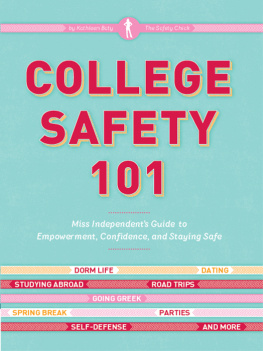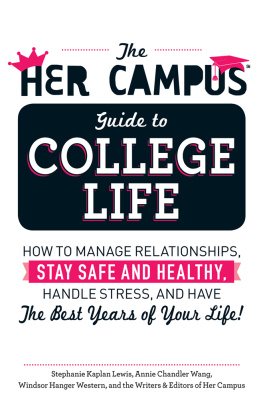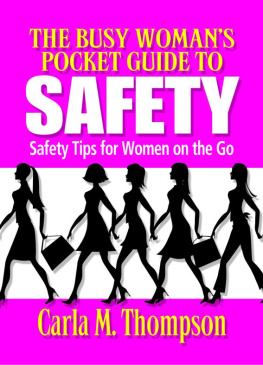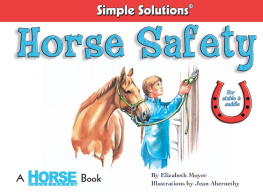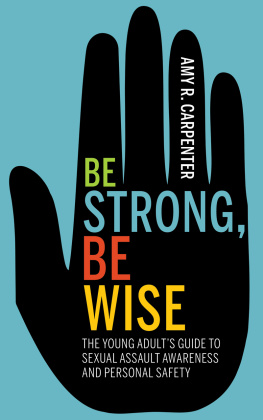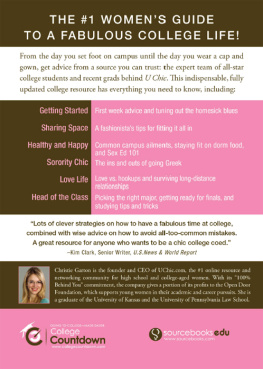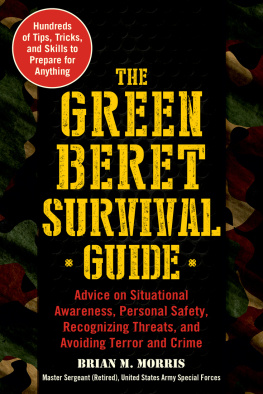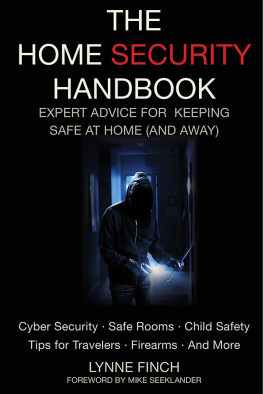This book is dedicated to four vibrant, loving, and talented young college students, who tragically lost their lives to senseless acts of violence.
Eve Marie Carson, student body president of the University of North Carolina Lauren Burk, a freshman at Auburn University Kimberly Smith, a senior at Columbia College, Missouri Yeardley Love, a senior at University of Virginia
May everyone who reads this book honor their memories by living happy, strong, positive, and empowered lives.
Introduction:
Meet the Safety Chick
Congratulations, Miss Independent! What an awesome journey. All the hard work of elementary school, junior high, and high school has finally paid off. You are headed to college (or you have arrived already!), getting ready to take the classes and make the grades necessary for becoming the next Nobel Peace Prize winner, CEO of a Fortune 500 company, mother of the year, or even the new host of American Idol!
But as you enter this brave new world, it is important to keep your grip on some basic wisdoms. And the one I am concerned with is: You arent going to get far if you arent safe!
Personal safety is one of those tricky things we may not think about much consciously until something rears up to remind usand with safety, that thing can often come with a jolt, sometimes a big one. Sometimes even a big bad one. But must it take becoming a crime victim to start caring about your personal safety? The answer of course is, No! My friend Dana Getzinger Foley and I were talking about this the other day. She, like me, was a crime victim in college (you can read her amazing story on page 21), but what she and I continue to commiserate about is the fact that so often people dont actually take the time to educate themselves about or take preventative measures for their personal safetyuntil it is too late.
Here are the facts: The odds of being a victim of a random act of violence are slim to none if you make smart personal-safety choices. If you let yourself kind of coast in denial, or general fear makes you avoid thinking about it and educating yourself, your odds of becoming a victim go up. The moment when you head off to college can be intimidating and/or overwhelming, and thus prime time for some brain freezeafter all, you are facing living alone in a dorm for the first time in an unfamiliar environment, with new roommates, new schedules, and so on. I tailored this book to the needs of young women during this wonderful but very busy and complex time as a kind of safety handbook, with frank talk, guidelines, resources, advice, and philosophy on a range of issues for the newly independent from campus to Facebook to shopping to self-defense. Please, do me a favor and make the choice to learn how to protect yourself against crime. And remember, caring about your personal safety is not about living paranoidit is about living smart. It translates into every aspect of your life; it makes you a better student, co-worker, daughter, sister, friend. Trust me, while I would not change a moment of my life and the incidents that have brought me here today, I do not want you ever to experience the debilitating fear and emotional trauma that I have endured from being a victim.
Who Is the Safety Chick?
In November of 1982, I answered a phone call that would change my life forever. On the other end of the line was a former high school acquaintance, who had become fixated on me and decided to make my life a living hell. After the first one, there were many other harassing calls. By a long and perilous process, the situation came down to this man showing up at my door with a semiautomatic weapon and 180 rounds of ammunition. The high (or rather, low) point, ultimately, was his attempting to kidnap me and an eleven-hour police standoff. At the time, there were no laws on the books declaring stalking a felony, and so my official recourse was minimal; every time this person violated a restraining order issued on my behalf, the penalty was just a brief stay in county jail. Over the years, I gained first-hand knowledge of how our legal system works, as well as the trial-by-fire survival skills that one day saved my life.
What does not destroy me makes me stronger.Friedrich Nietzsche
When the threatening behavior of the stalkerI learned to understand the true meaning of this wordpersisted and then escalated, my whole existence came to be consumed by fear and insecurity. In the beginning, I was living in denial, thinking that this guy would go away and everything would return to normal. No such luck. I tried to maintain some semblance of a normal life (going to college, participating in activities, building friendships, even getting married), but being pulled by the tension between these two realities was an extremely emotional and exhausting way to live.
One afternoon, I came home from work. Per my routine, I went to the phone, punched a button, and stood listening to the messages on my answering machine. Then I turned around, and found my stalker standing behind me with a knife. This one moment was the culmination of a cat-and-mouse game that had been going on for eight years. My instant reaction was one that surprised both the stalker and me. My first words were, Sit down, Ive been expecting you. We need to talk. My demeanor was calm and in control. I could feel the power shift; I could see a bit of insecurity and nervousness set in, could tell that he was wondering why I was being so unperturbed and apparently hospitable. I realized he was probably expecting me to react with terror, which would make me weak and thereby feed his power and purpose. I truly believe that my cool and confident demeanor got me out of that life-threatening situation physically unharmed. My calmness allowed my stalker to feel comfortable guiding me outside, thus letting his guard down. He did not realize the police had surrounded the house, and in one fell swoop I was able to run away to the waiting arms of a policeman, and he was left in a standoff with the police. They were able to get a handle on the situation and arrest him without anyone getting seriously hurt. This was the start of the Safety Chick mindset: You can make the choice to take control of the fear.
A few months after my confrontation with the stalker, I was contacted by Ed Royce, currently a U.S. congressman and at that time a California state senator who was working on anti-stalking legislation hed written that would make the crime a felony. He asked if I would testify in front of the state senate. As I sat in front of the committee, recounting each event, I began to feel a power inside me that I had not felt in a long time. It was at that moment that I realized I no longer had to live like a victim. The way to get my power back was to become proactive. This is the second phase of the Safety Chick mindset: Taking control of your own actions gives you inner strength and a sense of empowerment.
In the wake of these experiences, I started speaking at law-enforcement training workshops all over the country. This work introduced me to all kinds of incredible personal-safety and threat-assessment experts and exposed me to their valuable information. I realized that the developments in understanding and strategy needed to get out to the people who could really use it the most: women. Most of the existing personal-safety information circulating seemed to me to be set in a tone and terms to make women feel frightened and overwhelmed, not confident and capable. This is what led to the third phase of the Safety Chick mindset: Being aware of your personal safety should be as routine as brushing your teeth. Implementing personal-safety behaviors should not be an ominous, paranoid, and/or hysterical process, but rather one with a positive, confident attitude combined with lots of common sense.

